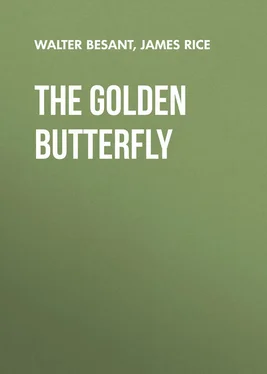Walter Besant - The Golden Butterfly
Здесь есть возможность читать онлайн «Walter Besant - The Golden Butterfly» — ознакомительный отрывок электронной книги совершенно бесплатно, а после прочтения отрывка купить полную версию. В некоторых случаях можно слушать аудио, скачать через торрент в формате fb2 и присутствует краткое содержание. Жанр: foreign_antique, foreign_prose, на английском языке. Описание произведения, (предисловие) а так же отзывы посетителей доступны на портале библиотеки ЛибКат.
- Название:The Golden Butterfly
- Автор:
- Жанр:
- Год:неизвестен
- ISBN:нет данных
- Рейтинг книги:3 / 5. Голосов: 1
-
Избранное:Добавить в избранное
- Отзывы:
-
Ваша оценка:
- 60
- 1
- 2
- 3
- 4
- 5
The Golden Butterfly: краткое содержание, описание и аннотация
Предлагаем к чтению аннотацию, описание, краткое содержание или предисловие (зависит от того, что написал сам автор книги «The Golden Butterfly»). Если вы не нашли необходимую информацию о книге — напишите в комментариях, мы постараемся отыскать её.
The Golden Butterfly — читать онлайн ознакомительный отрывок
Ниже представлен текст книги, разбитый по страницам. Система сохранения места последней прочитанной страницы, позволяет с удобством читать онлайн бесплатно книгу «The Golden Butterfly», без необходимости каждый раз заново искать на чём Вы остановились. Поставьте закладку, и сможете в любой момент перейти на страницу, на которой закончили чтение.
Интервал:
Закладка:
"I got your letter," said Mr. Cassilis, "and telegraphed to you because I was anxious not to miss you. My time is valuable – not so valuable as yours, but still worth something."
He spread his hands palm downwards, and at right angles to the perpendicular line of his body, had that been erect. But it was curved, like the figure of the man with the forelock.
"Still worth something," he repeated. "But I am here, Mr. Beck, and ready to be of any service that I can."
"My time is worth nothing," said the American, "because my work is done for me. When I was paid by the hour, it was worth the hour's pay."
"But now," Mr. Cassilis interposed, "it is worth at the rate of your yearly income. And I observe that you have unlimited credit – un-lim-it-ed credit. That is what we should hardly give to a Rothschild."
He wanted to know what unlimited credit really meant. It was a thing hitherto beyond his experience.
"It is my Luck," said Mr. Beck. "Ile, as everybody knows, is not to be approached. You may grub for money like a Chinee, and you may scheme for it like a Boss in a whisky-ring. But for a steady certain flow there is nothing like Ile. And I, sir, have struck Ile as it never was struck before, because my well goes down to the almighty reservoir of this great world."
"I congratulate you, Mr. Beck."
"And I have ventured, sir, on the strength of that introductory letter, to ask you for advice. 'Mr. Cassilis,' I was told, 'has the biggest head in all London for knowledge of money.' And, as I am going to be the biggest man in all the States for income, I come to you."
"I am not a professional adviser, Mr. Beck. What I could do for you would not be a matter of business. It is true that, as a friend only, I might advise you as to investments. I could show you where to place money and how to use it."
"Sir, you double the obligation. In America we do nothing without an equivalent. Here men seem to work as hard without being paid as those who get wages. Why, sir, I hear that young barristers do the work of others and get nothing for it; doctors work for nothing in hospitals; and authors write for publishers and get nothing from them. This is a wonderful country."
Mr. Cassilis, at any rate, had never worked for nothing. Nor did he propose to begin now. But he did not say so.
He sat nursing his leg, looking up at the tall American who stood over him. They were two remarkable faces, that thus looked into each other. The American's was grave and even stern. But his eyes were soft. The Englishman's was grave also. But his eyes were hard. They were not stealthy, as of one contemplating a fraud, but they were curious and watchful, as of one who is about to strike and is looking for the fittest place – that is, the weakest.
"Will you take a drink, Mr. Cassilis?"
"A – a – a drink?" The invitation took him aback altogether, and disturbed the current of his thoughts. "Thank you, thank you. Nothing."
"In the silver-mines I've seen a man threatened with a bowie for refusing a drink. And I've known temperate men anxious for peace take drinks, when they were offered, till their back teeth were under whisky. But I know your English custom, Mr. Cassilis. When you don't feel thirsty you say so. Now let us go on, sir."
"Our New York friend tells me, Mr. Beck, that you would find it difficult to spend your income."
Mr. Beck brightened. He sat down and assumed a confidential manner.
"That's the hitch. That's what I am here for. In America you may chuck a handsome pile on yourself. But when you get out of yourself, unless you were to buy a park for the people in the centre of New York City, I guess you would find it difficult to get rid of your money."
"It depends mainly on the amount of that money."
"We'll come to figures, sir, and you shall judge as my friendly adviser. My bar'ls bring me in, out of my first well, 2,500 dollars, and that's £500 a day, without counting Sundays. And there's a dozen wells of mine around, not so good, that are worth between them another £800 a day."
Mr. Cassilis gasped.
"Do you mean, Mr. Beck, do you actually mean that you are drawing a profit, a clear profit, of more than £1,300 a day from your rock-oil shafts?"
"That is it, sir – that is the lowest figure. Say £1,500 a day."
"And how long has this been going on?"
"Close upon ten months."
Mr. Cassilis produced a pencil and made a little calculation.
"Then you are worth at this moment, allowing for Sundays, at least a quarter of a million sterling."
"Wall, I think it is near that figure. We can telegraph to New York, if you like, to find out. I don't quite know within a hundred thousand."
"And a yearly income of £500,000, Mr. Beck!" said Mr. Cassilis, rising solemnly. "Let me – allow me to shake hands with you again. I had no idea, not the slightest idea, in asking you to my house the other day, that I was entertaining a man of so much weight and such enormous power."
He shook hands with a mixture of deference and friendship. Then he looked again, with a watchful glance, at the tall and wiry American with the stern face, the grave eyes, the mobile lips, and the muscular frame, and sat down and began to soliloquise.
"We are accustomed to think that nothing can compare with the great landholders of this country and Austria. There are two or three incomes perhaps in Europe, not counting crowned heads, which approach your own, Mr. Beck, but they are saddled. Their owners have great houses to keep up; armies of servants to maintain; estates to nurse; dilapidations to make good; farmers to satisfy; younger sons to provide for; poor people to help by hundreds; and local charities to assist. Why, I do not believe, when all has been provided for, that a great man, say the Duke of Berkshire, with coal-mines and quarries, Scotch, Irish, Welsh, and English estates, has more to put by at the end of the year than many a London merchant."
"That is quite right," said Mr. Beck; "a merchant must save, because he may crack up; but the land don't run away. When you want stability, you must go to the Airth. Outside there's the fields, the rivers, the hills. Inside there's the mines, and there's Ile for those who can strike it."
"What an income!" Mr. Cassilis went on. "Nothing to squander it on. No duties and no responsibilities. No tenants; no philanthropy; no frittering away of capital. You can't spend a tenth part of it on yourself. And the rest accumulates and grows – grows – spreads and grows." He spread out his hands, and a flush of envy came into his cheeks. "Mr. Beck, I congratulate you again."
"Thank you, sir."
"I see, Mr. Beck – you are yet an unmarried man, I believe, and without children – I foresee boundless possibilities. You may marry and found a great family; you may lay yourself out for making a fortune so great that it may prove a sensible influence on the course of events. You may bequeath to your race the tradition of good fortune and the habit of making money."
"My sons may take care of themselves," said Mr. Beck; "I want to spend money, not to save it."
It was remarkable that during all this generous outburst of vicarious enthusiasm Mr. Beck's face showed no interest whatever. He had his purpose, but it was not the purpose of Mr. Cassilis. To found a family, to become a Rothschild, to contract loans – what were these things to a man who felt strongly that he had but one life, that he wished to make the most of it, and that the world after him might get on as it could without his posthumous interference?
"Listen Mr. Beck, for one moment. Your income is £500,000 a year. You may spend on your own simple wants £5,000. Bah! a trifle – not a quarter of the interest. You save the whole; in ten years you have three millions. You are still under fifty?"
Читать дальшеИнтервал:
Закладка:
Похожие книги на «The Golden Butterfly»
Представляем Вашему вниманию похожие книги на «The Golden Butterfly» списком для выбора. Мы отобрали схожую по названию и смыслу литературу в надежде предоставить читателям больше вариантов отыскать новые, интересные, ещё непрочитанные произведения.
Обсуждение, отзывы о книге «The Golden Butterfly» и просто собственные мнения читателей. Оставьте ваши комментарии, напишите, что Вы думаете о произведении, его смысле или главных героях. Укажите что конкретно понравилось, а что нет, и почему Вы так считаете.












